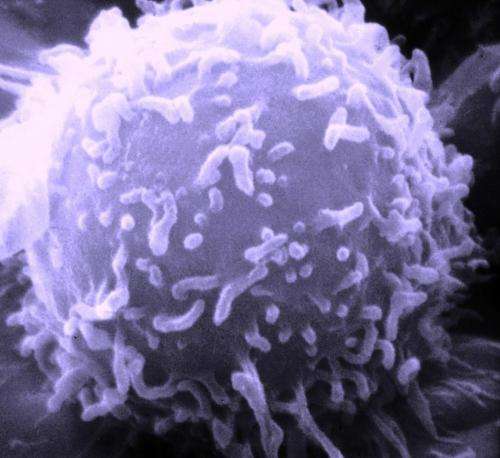New way to target some rapidly dividing cancer cells, leaving healthy cells unharmed

Scientists at Johns Hopkins Medicine and the University of Oxford say they have found a new way to kill some multiplying human breast cancer cells by selectively attacking the core of their cell division machinery. The technique, so far tested only on lab-grown and patient-derived cancer cells, could advance efforts to find drugs that kill breast cancer cells in a subset of patients, and leave healthy cells unharmed.
A summary of the scientists' findings are published Sept. 9 in Nature.
"Some of the most widely used cancer drugs already kill rapidly dividing cells," says Andrew Holland, Ph.D., associate professor of molecular biology and genetics at the Johns Hopkins University School of Medicine. "However, most of these drugs have notable drawbacks, including killing healthy cells, such as fast-multiplying bone marrow cells, along with the cancer cells."
Holland, whose research focuses on mammalian—including human—cell division also notes that unchecked mistakes in cell division can fuel genetic errors that, in some cases, go on to develop into cancer cells.
Because all mammalian cells have similar processes for cell division, Holland and his team have looked for cell division mechanisms specific to cancer cells in a variety of lab-grown cells.
During their search, he says, they came across a line of human breast cancer cells that are very dependent on cell structures called centrioles to divide and survive. Centrioles act as the structural core of centrosomes, which organize thin tubes of proteins that give cells their shape and help separate DNA when the cell divides. However, many cells can divide without centrioles and centrosomes.
Although other cells are able to live without centrioles, Holland's team found that these lab-grown breast cancer cells could not.
Close analysis showed that the centriole-dependent breast cancer cells had a section of genome that had been abnormally copied many times, an alteration found in about 9% of breast cancers. The researchers studied the genes encoded in the highly copied region and found a gene that was producing high levels of a protein—TRIM37—shown to control centrosomes.
Next, the researchers tested a way to interfere with the cell division process in the cells with high TRIM37 levels. They used an experimental drug called a PLK4 inhibitor, which disrupts proteins that make centrioles. They added the drug to the lab-grown breast cancer cells with normal TRIM37 levels and found that the cells were able to successfully divide, even though the drug had removed the cell's centrioles.
However, when they added the drug to breast cancer cells with high TRIM37 levels, the opposite happened—the cells could no longer divide and most cells stopped growing or died.
"The idea would be to identify tumors with high levels of TRIM37 and use a PLK4 inhibitor to selectively kill cancer cells and leave healthy cells relatively unharmed," says Holland.
The Johns Hopkins and Oxford teams also discovered why high levels of TRIM37 leave cells vulnerable to drugs that remove centrioles.
Holland's previous research has shown that normal cells can divide without centrioles, because the material around the centriole, called the pericentriolar material, is able to do the same job as centrosomes.
In the current study, the researchers found that high levels of TRIM37 cause cells to degrade pericentriolar material. Thus, by adding a drug that removes centrioles, the cells have no way—either with centrosomes or pericentriolar material—to organize the tubes that help divide the DNA during cell division.
Now, Holland and his team are looking for other, more stable drugs similar to the PLK4 inhibitor used in the current study and are attempting to identify additional human cancer cell lines that are sensitive to these inhibitors.
More information: Targeting TRIM37-driven centrosome dysfunction in 17q23-amplified breast cancer, Nature (2020). DOI: 10.1038/s41586-020-2690-1 , www.nature.com/articles/s41586-020-2690-1


















